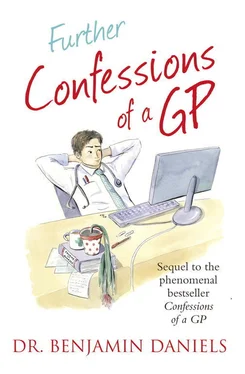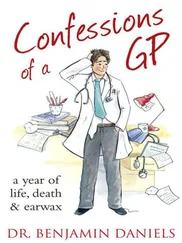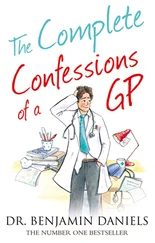As medics, our constant exposure to death and dying must affect us, and perhaps force us to consider our own mortality more intently. Personally, I still fear death, but I don’t dread it anywhere near as much as I fear being kept artificially alive in a state that offers constant pain and suffering. In his essay ‘How Doctors Choose to Die’, Ken Murray talks about his doctor friend who was found to have pancreatic cancer. Understanding the real consequences of this, his friend declined all the surgery, chemotherapy and radiotherapy that was offered, and instead chose to spend his last months dying peacefully at home with his family around him. As a doctor he had seen enough during his career to be able to make an informed choice about how he wanted his own life to end. If he hadn’t been a doctor, he may well have lived a little longer, but equally suffered a whole lot more.
But if doctors routinely choose to reject life-prolonging treatments for themselves, why do they often push so hard to keep their patients artificially alive?
There was a bad joke that went around medical school: why do coffins have the lid nailed on?
Answer: to keep the oncologists out.
As doctors, it can feel like stopping treatment is an admission of failure. We do often maintain treatment for too long, and definitely need to get better at stepping back and saying enough is enough. However, although we know that letting go is in the best interests of our patient, sometimes we fear that by withholding treatment we will be criticised and accused of callous laziness.
The Liverpool Care Pathway is a system that was set up to allow patients with terminal illness to die peacefully and with dignity. However, this protocol for allowing a natural death was picked up by many parts of the media as being cruel and barbaric. Grieving relatives accused doctors of allowing their nearest and dearest to die prematurely. Scared relatives requested that their dying relatives weren’t put on this so-called ‘death’ pathway, and as a result many people will have died after enduring more suffering than they needed to.
Despite all the uproar about the Liverpool Care Pathway, I always find it odd that its strongest critics never asked whether doctors would ever allow themselves or their loved ones to be put on it. As doctors, why aren’t we asked more often what treatments we would and wouldn’t give to ourselves or our own families? When I chose a boiler for my house, I asked the plumber which type he had at home. When I’m choosing dessert in a restaurant, I ask the waitress which one she likes best. There is nothing like a bit of inside knowledge when making a tough decision – and they don’t get much bigger than decisions about pudding!
Doctors make mistakes and get things wrong all the time, but we’re not, as large segments of society seem to feel, part of some sort of big evil conspiracy. For example, wasn’t it telling that throughout the whole MMR furore, I never met a single doctor who didn’t give the MMR vaccine to their own child? In the same vein, I don’t know any doctors or nurses who wouldn’t allow themselves to die on the Liverpool Care Pathway.
Having said all this, of course this is only my opinion. Who am I as a doctor to decide what should and shouldn’t be considered good quality of life and when care should or shouldn’t be held back? We doctors are accused often enough of playing God, and so in an ideal world, patients themselves would make informed choices about how they die and be in complete charge of every decision along the way. The problem is that, in reality, once we get to this late stage in life, many of us will be too ill and confused to make any coherent decisions. Relatives will be forced to make really difficult decisions; often love for a family member will mean wanting them to be around for as long as possible. I wonder if this is what is happening at the moment with Nelson Mandela? If he is still alive at the time of reading, that is. He is loved by a whole nation, and they understandably don’t want to let him go.
These difficult end-of-life decisions are never easy, but as someone who has to deal with them often my only advice is to talk to your families now and tell them how you would like to die. It is a taboo subject, but it will happen to all of us eventually. I would urge you to write a living will, also known as an ‘advance directive’ or ‘advance decision’. Don’t leave it to doctors or tearful relatives – let everyone know now what you would like to happen were you to become so ill that you could no longer make decisions for yourself.
Miss Blumenthal, the elderly Holocaust survivor, died peacefully in the night. By the next afternoon, her room in the nursing home had been filled by a new patient, Rita.
While Miss Blumenthal had been a serene and model resident, Rita was causing a bit more of a stir. I could see the exasperation on Nurse Carmela’s face as she answered the front door to me.
‘Oh, Dr Daniels, this lady is very tricky,’ Carmela warned me as I followed her through to her room.
‘Oh, come on, Carmela, she’s 92 years old. How much trouble can she be?’
Rita was sitting in an armchair at the window with a cigarette held loosely between two yellow nicotine-stained fingers. There were small brown cigarette burns all over her nightie, and as we walked in she nonchalantly stubbed out her cigarette on the windowsill, completely ignoring the pristine ashtray that was just a few inches away. Rita had a tiny frame and you could make out almost her entire skeleton under her taut skin. Her hair was completely white and its straggly appearance suggested that she hadn’t conformed to the blue rinse perm that most of her com-patriots in the nursing home proudly sported.
‘We’ve been telling her she can’t smoke in her room but she won’t listen to us,’ Carmela whispered to me.
Rita turned to look at us with some disdain. ‘’Ere, who the fuck is he?’ she asked, looking me up and down with a steely gaze.
‘I’m your new doctor, Rita. It’s very nice to meet you,’ I smiled nervously, holding out my hand.
‘He can’t be a doctor,’ Rita replied, completely ignoring my outstretched hand.
‘He looks too young to be a doctor, no Rita?’ Carmela chirped.
When I first qualified, my patients would often comment that I looked far too young to be a doctor. It annoyed me back then, but at this point I was well into my 30s and ready to take any remarks on my youthful appearance as a compliment.
‘What! Nah, he don’t look too young to be a doctor, just too bleeding stupid! Look at that face. Grinning like a fucking chimpanzee. Which brainless bugger gave him a medical degree? No wonder the whole bleeding country’s gone down the swanny.’
Slightly taken aback, I tried again with my charm offensive. ‘So, Rita, how are you settling into your new home?’
‘What ’ere? This fucking shit ’ole? This ain’t my bloody ’ome I can tell ya. Packed me off ’ere to die they did, but ’ere I’ll tell you one thing…’ Rita leaned forward and looked around as if she was about to whisper to me a great secret that no one else should hear. ‘I’LL OUTLIVE THE FUCKING LOT OF YA!’ she bellowed right into my ear and then let out an enormous cackle that sent her ill-fitting dentures rattling around in her mouth.
Once she’d stopped cackling, Rita decided that my audience with her had come to an end and she shooed me unceremoniously out of her room.
‘Go on, bugger off, you. I’ll die when I’m good and fucking ready without no meddling doctors and their dirty snake charms.’
With that, I took Rita’s less than tactful social cue to leave and wondered exactly what I could write in her medical notes that could politely summarise our consultation. I was rather looking forward to being Rita’s GP for some time to come, but unfortunately the nursing home manager felt she was a fire hazard and managed to move her on to a different nursing home looked after by another GP surgery. A great shame.
Читать дальше
Конец ознакомительного отрывка
Купить книгу











![Benjamin Franklin - Memoirs of Benjamin Franklin; Written by Himself. [Vol. 2 of 2]](/books/747975/benjamin-franklin-memoirs-of-benjamin-franklin-wr-thumb.webp)
![Benjamin Franklin - Memoirs of Benjamin Franklin; Written by Himself. [Vol. 1 of 2]](/books/748053/benjamin-franklin-memoirs-of-benjamin-franklin-wr-thumb.webp)